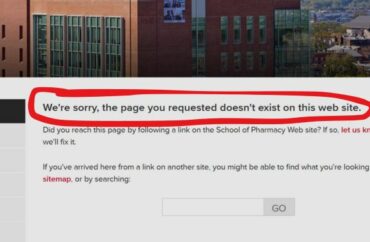
Scholarship now includes broader ‘underserved’ definition
The University of Maryland rewrote a new scholarship for “underrepresented minorities” following a College Fix inquiry.
The School of Pharmacy, located in Baltimore, sought “applicants for five scholarships for students who are underrepresented in regulatory science that start in Fall 2024,” a since-deleted page stated.
“Individuals who [identify] as Black or African American, Hispanic or Latino, American Indian or Alaska Native, Native Hawaiian and other Pacific Islander, or individuals from low socioeconomic status backgrounds (e.g. rural, low-income or health professional shortage area) are encouraged to apply,” the website stated.
It now returns a 404-error message.
“We’re sorry, the page you requested doesn’t exist on this web site,” the website now states.
A new page now includes “underserved communities,” with a broader definition of “underrepresented.”
“We encourage applications from a broad range of applicants from diverse backgrounds,” the new listing states. “Underrepresented is a continually evolving reality reflecting changing demographics of society, the profession, and specialties within the profession.”
“Underrepresented can include students who identify as underrepresented based on sex, race, national origin, religion, disability, first generation professional school attendance, and background in an economically disadvantage community (e.g. rural, low-income or health professional shortage area),” the website states.
It follows an announcement from the school it would be rewriting the scholarship.
“The goal of the scholarship is in alignment with [National Institutes of Health] efforts to foster scientific innovation, enhance global competitiveness, and improve the quality of research by fostering diverse scientific teams that include members of underrepresented groups in STEM professions, Alex Likowski, a spokesperson, told The Fix via email in early April.
Asked if students from other categories could be considered, Likowski said the university “understand[s] that ‘underrepresented’ is an evolving reality.”
“Strategies that enrich and expand underserved pools of talent for STEM and AI fields such as women, people of color, people in rural and urban centers, and health professional shortage areas, are underrepresented in these fields,” Likowski said. He said “the language used on the website is being modified to better reflect that.”
The scholarships would be beneficial to the students for years after receiving them, in the form of higher wages, according to the since-deleted page.
MORE: Paramedic group scrubs no-whites-allowed scholarship after lawsuit
They would “provide all tuition for the online, part-time MS in Regulatory Science.”
“Each $30,000 underrepresented minority scholarship will translate to more than $400,000 in increased earnings,” the website stated. “The $3 million in total scholarships will translate to more than $40 million in increased earnings by underrepresented minorities, along with greater career opportunities.”
The university cited a 2019 notice from the NIH which suggested “research shows that diverse teams working together and capitalizing on innovative ideas and distinct perspectives outperform homogenous teams.”
“Scientists and trainees from diverse backgrounds and life experiences bring different perspectives, creativity, and individual enterprise to address complex scientific problems,” the website stated.
The NIH has a “compelling interest in supporting a diverse biomedical research workforce that includes individuals from groups that are currently underrepresented in the biomedical, clinical, behavioral and social sciences,” according to the notice.
“Underrepresented includes “individuals from racial and ethnic groups that have been shown by the National Science Foundation to be underrepresented in health-related sciences on a national basis.”
The notice has since been rescinded but a new version includes similar language.
The National Institutes of Health has poured millions of dollars of taxpayer money into identity politics research.
The Fix identified at least $297 million in NIH-funded projects focusing on racism, in a 2022 analysis article.
MORE: Harvard scrubs ‘How to Blow Up A Pipeline’ film info from website
IMAGE: University of Maryland; College Fix edits





Please join the conversation about our stories on Facebook, Twitter, Instagram, Reddit, MeWe, Rumble, Gab, Minds and Gettr.